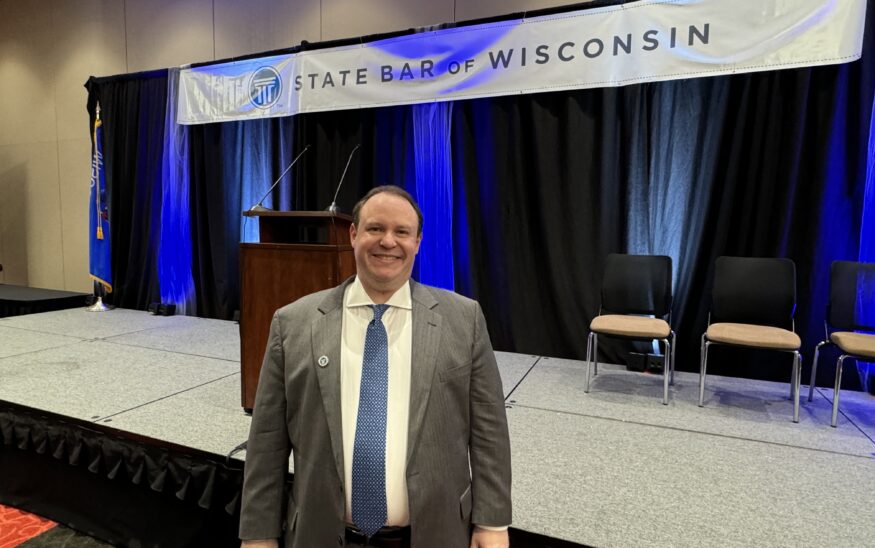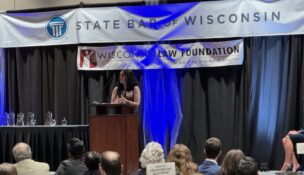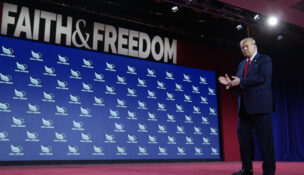State Bar swears in new president, spotlights judicial and cyber security at annual conference
By: Steve Schuster, [email protected]//June 20, 2024//
State Bar swears in new president, spotlights judicial and cyber security at annual conference
By: Steve Schuster, [email protected]//June 20, 2024//
The State Bar of Wisconsin’s Annual Meeting & Conference began Wednesday in Green Bay with the Board of Governors meeting and swearing-in ceremony of incoming President Ryan Billings.
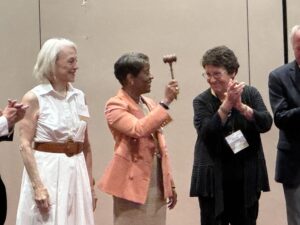
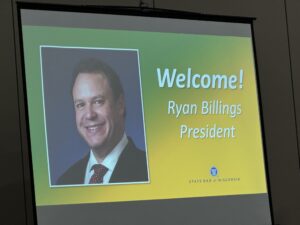
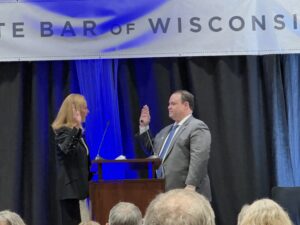
Billings, a shareholder and chair of Litigation at Kohner, Mann & Kailas, said he is committed to improving Wisconsin’s legal system and is making “lawyer wellbeing” and mental health a priority.
“I am always thinking about the (legal) system and how we can continue to work to help to make it better, and that’s why I put my hat in the ring,” Billings said Wednesday after being sworn in.
Earlier Wednesday, Judge Audrey Skwierawski, now director of state courts, received a glowing introduction as Wisconsin’s first female director of state courts during the Board of Governor’s meeting.
Condolences were expressed for the passing of Skwierawski’s father, Judge Michael Skwierawski, “a long time member of the State Bar and a well-respected and distinguished jurist.”
Skwierawski expressed humility and gratitude, thanking the Wisconsin legal community for the work they do each day and specifically thanked her predecessor, Judge Randy Koschnick.
“The last time you heard from us was from Judge Koschnick. I want to thank Judge Koschnick for his leadership; his many years of service,” Skwierawski said, noting Koschnick’s role in helping to resolve Wisconsin’s constitutional crisis on case backlogs.
Skwierawski noted that she is in her 30th year of service to Wisconsin government.
“I am an ambassador to you for all of the employees who work for the government in our court system,” Skwierawski said, noting, “We have hundreds of employees who have dedicated huge portions of their working life to all of our joint and shared mission.”
Skwierawski noted the court system is very mission driven.
“To protect individual rights, privileges and liberties, to maintain the rule of law and to provide a forum for the resolution of disputes that is fair, accessible, independent and effective,” Skwierawski said, noting the verbiage comes from the Supreme Court of Wisconsin rules.
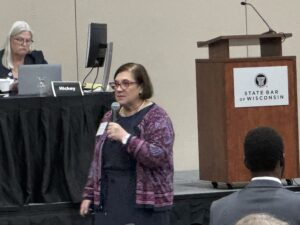
In Skwierawski’s role as courts director, she oversees many areas ranging from CCAP and the state law libraries to the Office of Lawyer Regulation’s budget.
Skwierawski also discussed the history and context behind the recently passed Judicial Security Package, noting the brutal torture and murder of Judge Roemer.
Roemer was murdered at his own home by a man the judge had sentenced to prison years earlier.
As previously reported by the Wisconsin Law Journal in March, three bipartisan bills requested by the Wisconsin Supreme Court in response to threats of violence against judges were signed into law by Gov. Tony Evers.
“Unfortunately, the person was able to find out where Judge Roemer lived and was able to break into his residence and tortured him, fastened him to a chair and killed him,” Skwierawski said.
“I want you to understand the genesis of our legislation and what are judges are up against,” Skwierawski said.
Skwierawski noted that 50% of defendants leave a courtroom unhappy. “Those people may be just waiting out there for a specific moment, unfortunately like Judge Roemer.”
“In light of Judge Roemer’s homicide, Chief Justice Zieglar introduced a number of different security measures,” Skwierawski noted.
According to Skwierawski, the chief justice originally asked for justices to have their own security force, similar to Illinois. However, she noted the Legislature turned down that request.
“Justice Ziegler then asked a legislative committee in a continuing effort to address security from a different angle,” Skwierawski said.
Skwierawski also noted how she is “putting out a lot of fires” in the context of addressing the challenges facing the court system, including the shortage of attorneys and court reporters, remaining case backlogs from COVID, and revenue trends down while demand for services increases.
As previously reported by the Wisconsin Law Journal, on June 6 Wisconsin Supreme Court Chief Justice Annette Ziegler announced the creation of the Attorney Retention & Recruitment Committee to address Wisconsin’s attorney shortage, which is particularly acute in rural counties.
The committee is comprised of the deans of Wisconsin’s two law schools, representatives of the State Bar of Wisconsin, and attorneys and judges from around the state. Chief judges from the state’s nine judicial administrative districts will help lead the effort, according to court officials.
Cyber security
“The demands on our work have increased and we have increased expenses like cyber security that didn’t even exist when CCAP came into existence,” Skwierawski said, noting that it’s not just the courts that are at risk.
“If any of you have been watching the Ascension nightmare in which I think it was Russian hackers … 20 years of my data is in the wind, somewhere in Russia,” Skwierawski said.
Passing of the gavel and new board leadership
Melanie Wiseman was elected chair of Board of Governors and State Bar leadership expressed gratitude to outgoing President Dean Dietrich’s leadership.
State Bar Executive Director Larry Martin said, “Dean you have been tireless in leading us.”
A motion passed to approve six nominees to the executive committee.
- Randal Brotherhood
- James Goldschmidt
- Erik Guenther
- Lisa Lawless
- Rachel Maes
- Annabelle Vang
Juneteenth
State Bar leadership noted the significance of holding the first day of the annual meeting and conference on Juneteenth as the State Bar’s mission includes freedom and democracy.
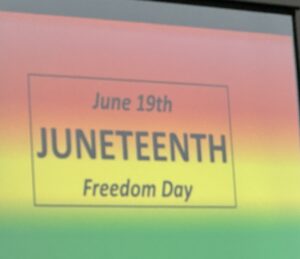
DEI
Outgoing president Dietrich requested approval of the revised petition to be submitted to the Supreme Court “that would provide for credit eligibility for programs that discussed cultural competency, reduction of bias and the interplay with the law practice.”
Several governors spoke up on the proposal, which received a mix of praise and criticism. Leadership expressed hope on future initiatives.
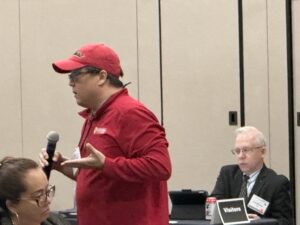
“Many in the room know we submitted a somewhat similar petition a year ago and did not even get a hearing. It was voted down and denied by the Wisconsin Supreme Court,” said State Bar Past-President Margaret Wrenn Hickey.
The Board of Governors went into a closed session to address litigation against the State Bar of Wisconsin by WILL over the DEI program.
The Diversity and Inclusion Oversight Committee provided a written report on the committee’s work.
According to a copy of the report obtained by the Wisconsin Law Journal, the Diversity Inclusion & Oversight Committee (DIOC) “continues to support Diversity, Equity, Inclusion, and Accessibility in the legal profession.”
State Bar of Wisconsin staff attended an event hosted by the Wisconsin Association of African American Lawyers’ efforts to continue to collaborate with the Affinity Bar Groups, according to the report.
The Diversity Clerkship Program (DCP) hosted a soft skills workshop for the FY24 clerks at the State Bar. The facilitators are members of the Wisconsin Hispanic Lawyers Association and the Association of African American Lawyers, the report noted.
A Diversity Clerkship Recognition Reception will be held on July 18, 2024, at 5:30 p.m. The event will be held at the State Bar Center.
“The State Bar is committed to exposing law students to the benefits, services, and experiences the State Bar offers to members so they will choose to practice law in Wisconsin and become active in the State Bar when they graduate,” the report states.
Also, according to the report, State Bar of Wisconsin staff attended the Graduation Fair at Marquette University Law School. The Law Student newsletter was released to the students in April 2024. “Just the Facts”
Click here to view the entire Board of Governor’s agenda.
Thursday
On Thursday, the State Bar’s 2024 Annual Meeting and Conference opening ceremony began at 7:45 a.m. The opening plenary: Using Artificial Intelligence with both the benefits and risks in mind began shortly after 8 a.m. 
Screenshot from an email from State Bar of Wisconsin to the Wisconsin Law Journal. The Wisconsin Law journal was not allowed to take still photographs, video, or audio record the opening plenary.
Thursday morning, the Wisconsin Law Journal requested permission from the State Bar to take still photos and the request was denied, citing more advanced notice would have need to be given to get permission from the speakers.
Judge Scott Schlegel and Professor David Kemp led Thursday’s opening plenary.
According to the panel, 16-33% of Westlaw and Lexis AI results are inaccurate.
“That may be good enough to pass the bar exam .. but that’s not the standards we hope for ourselves,” a panelist said.
CLE sessions run from 9:50 a.m. to 4:30 p.m. Thursday.
From 9:50 a.m. to 10:50 a.m. the Appellate Practice Session presented the CLE “Cooks in the Kitchen: Law Development in the Wisconsin Court System.”
According to the State Bar, in Cook vs. Cook the Wisconsin Supreme Court held the Wisconsin Court of Appeals does not have the power to overrule, modify, or withdraw language from its prior decisions.
The panel is being moderated by Joseph Diedrich with Husch Blackwell.
Wisconsin Supreme Court Justice Rebecca Dallet introduced the panel.
Panelists include: Bryna Godar, Hannah Schiebe with the Wisconsin Department of Justice, and Hon. Paul Reilly.
“Keep your options open,” said Schiebe.
Other Thursday morning CLE programs include a discussion on Judicial and Expert Witness Perspectives on the Discovery of Electronically Stored information, and the Practical Applications of AI.
Additional CLE sessions will be held Thursday morning, including on Legal Ethics and Guidance from the bench to young lawyers.
Thursday afternoon a CLE on Unconscious Bias will be held by Derek Mosley, Marquette University Law School.
Also Thursday afternoon, Wisconsin Supreme Court Justice Ann Walsh Bradley, Diane Diel, Hon. Hannah Dugan, and others will hold a CLE on Five Important Wisconsin Legal Developments affecting Women and the Women Lawyers who advanced them.
Thursday evening an awards presentation will honor attorneys, judges, law firms, students, and organizations who’ve made important contributions to Wisconsin and the legal profession.
The conference will close Friday at 12:30 p.m. with a closing plenary: Communicate More Effectively.
Friday’s opening plenary will feature legal ethics lesson in a ‘Family Feud’ style game.
Editor’s Note: The Wisconsin Law Journal is prohibited from videoing any of the conference and only allowed to photograph or audio record certain portions of the 2024 annual meeting and conference.
Legal News
- Milwaukee judge among legal community honored by State Bar
- Milwaukee-based Lockheed Martin subsidiary part of $70 million Navy settlement
- Wisconsin judge to weigh letting people with disabilities vote electronically from home in November
- Facebook warrant upheld despite close question on particularity
- Democratic Party of Wisconsin Jewish caucus statement on Dobbs anniversary
- Trump endorses Ten Commandments in schools, implores evangelical Christians to vote in November
- State Bar of Wisconsin CLE session on bias sparks controversy
- Wis. Supreme Court to decide if brothers’ school district firing was unlawful
- Attorney General Kaul and Coalition reach $700 million agreement against Johnson and Johnson
- Wisconsin Supreme Court takes David Prosser’s name off law library, renames it for first woman lawyer
- Pursuit of Milwaukee carjacking suspects ends with police shooting 2 teens in stolen vehicle
- Appeals court rejects DWI defendants probable cause challenge
Case Digests
- Suppression of Evidence
- Condemnation Powers-“Pedestrian Way”
- Insurance-Statute of Limitations-Sanctions
- Ineffective Assistance of Counsel
- Ineffective Assistance of Counsel
- Evidence
- Seizure-Reasonable Suspicion-Jury Instructions
- Sentencing Guidelines
- Collective Action-Overtime Wages-Arbitration
- Sentencing Guidelines
- Delayed Disclosure-Mistrial Motion
- Sixth Amendment-Request for Jury Trial
